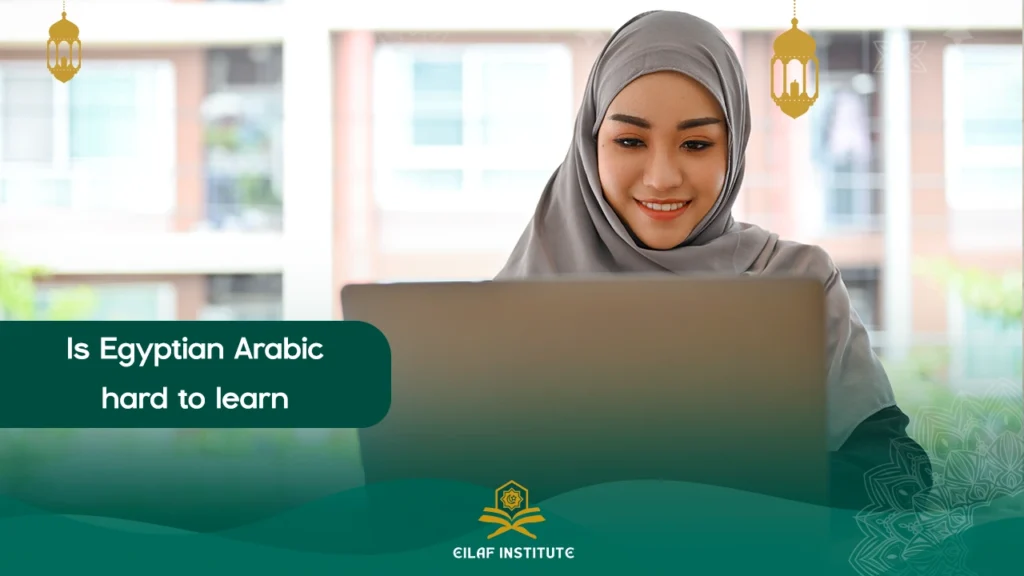If you’re considering learning Egyptian Arabic, you might be wondering: Is egyptian arabic hard to learn? The answer depends on your background, language learning experience, and dedication.
Egyptian Arabic (or Masri) is one of the most widely understood Arabic dialects. But like any language, it comes with its own challenges and advantages.
In this article, we’ll break down what makes Egyptian Arabic easier, or harder, to learn compared to Modern Standard Arabic or other dialects.
Is Egyptian Arabic Hard to Learn?
The allure of Egypt, with its rich history and vibrant Islamic tradition, draws many to its language, not only for travel or cultural connection but also as a pathway to understanding the Quran and Islamic teachings.
From the timeless streets of Cairo to the soulful recitations of the Quran, Egyptian Arabic opens doors to both everyday conversation and deeper engagement with the Islamic world. But is Egyptian Arabic hard to learn?
The short answer is: it’s challenging but achievable, and in fact, it offers one of the most accessible entry points to the Arabic language for new learners.
What Makes Egyptian Arabic Unique?
Often called Masri (meaning “Egyptian”), this dialect is more than just a local accent; it carries a special place in Islamic learning and culture. Its uniqueness comes from:
- Cultural Influence: understanding Masri helps you follow Islamic lectures, YouTube content, and TV programs widely used even in Quran study circles.
- Linguistic Blend: Egyptian Arabic includes words from Coptic, Turkish, French, and English, making it lively and modern, yet many Quranic and classical Arabic words are still present, helpful for connecting street language with Quranic roots.
- Simplified Grammar: Compared to Modern Standard Arabic (MSA), the language of the Quran. Egyptian Arabic drops many complex grammar rules, allowing you to focus more on speaking and listening early on.
Is Egyptian Arabic Hard to Learn for Beginners?
For English speakers, Arabic can be tough, classified as a Category IV language requiring serious time investment, but Egyptian Arabic softens this challenge.
Its relaxed grammar, frequent appearance in Islamic media, and availability of tutors make the process smoother.
Also, many Quranic concepts and vocabulary seep into daily Egyptian speech, linking your everyday practice with spiritual understanding.
Challenges Faced When Learning Egyptian Arabic
Learning Masri comes with these hurdles:
- Pronunciation: Letters like ع (‘ayn) and ح (ḥa) are unfamiliar to English speakers but essential for correctly pronouncing Quranic words like “الحمد” (Alhamdulillah).
- Root System: Arabic’s three-letter root system mirrors the Quran’s linguistic structure, so mastering this pattern benefits both conversational Masri and Quran comprehension.
- No Standard Spelling: Written Egyptian Arabic varies, but understanding this prepares you for navigating Quran translations and tafsir (exegesis) across cultures.
How Egyptian Arabic Compares to Modern Standard Arabic
Understanding the difference between Egyptian Arabic and Modern Standard Arabic (MSA) is key to setting the right goals.
Usage
- Modern Standard Arabic (MSA): Used in formal writing, books, news, and politics.
- Egyptian Arabic (Masri): Used in daily conversation, media, and music.
Grammar
- MSA: Complex grammar with case endings (i’rab) showing word function.
- Masri: Simplified grammar; case endings are mostly omitted.
Pronunciation
- MSA: Letter “ج” pronounced as “j” (like “joy”); “ق” pronounced as deep “q”.
- Masri: Letter “ج” pronounced as hard “g” (like “go”); “ق” often a glottal stop.
Vocabulary
- MSA: Formal, classical vocabulary.
- Masri: Everyday, practical words with unique and foreign terms.
This dual exposure, using Masri for people and MSA for scripture, strengthens both practical communication and religious understanding.
Tips to Make Learning Egyptian Arabic Easier
- Listen to Islamic Content: Listen to Egyptian Quran reciters, Islamic podcasts, and scholars on YouTube to absorb both Masri and Quranic styles.
- Learn Root Patterns: These roots appear in both Masri slang and Quranic language, helping you connect everyday words with their spiritual origins.
- Practice Speaking: Use religious greetings and phrases like “Alhamdulillah” or “Insha’Allah” in Masri to make Islamic language natural.
- Master Arabic Script: Knowing the script is key to reading the Quran properly while also helping you decode Masri written in Arabic.
- Use Islamic Mnemonics: Link new Masri words to Quranic verses or hadiths you know to improve memory and spiritual connection.
Resources for Learning Egyptian Arabic
You can learn Egyptian Arabic from many resources, such as apps and websites.
Or Media, try to watch Egyptian Islamic programs, lectures, and Quranic reflections on YouTube to hear authentic religious and casual Masri.
You can also Book Egyptian Arabic language course with us!
FAQ
Is it necessary to learn the Arabic script to speak Egyptian Arabic?
No, but to understand the Quran and Islamic texts properly, learning the script is essential. It opens the door to both Masri and religious study.
How long does it typically take to become conversational in Egyptian Arabic?
With regular practice, simple Masri for daily and Islamic expressions can be learned in 6–12 months. This includes common Quranic terms and greetings.
Can I learn Egyptian Arabic without prior knowledge of MSA?
Yes, but knowing some MSA enhances your Quran reading and understanding. Combining both gives you the full benefit: conversation with people and connection with scripture.

